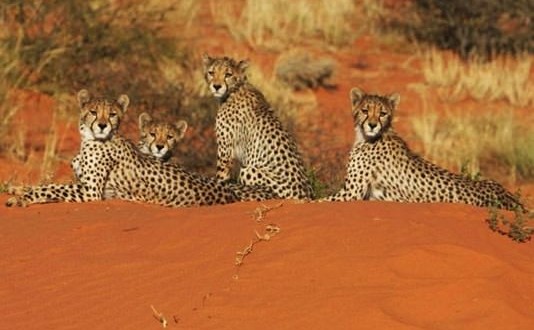Plummeting cheetah numbers may be down to humans making them travel further to find their prey, researchers have suggested.
Wild cheetahs are down to under 10,000 from 100,000 a century ago, with conventional wisdom blaming bigger predators for monopolising food as their habitat becomes restricted.
The traditional thinking has been that cheetahs no longer have sufficient access to prey to fuel their enormous energy output when engaging in super-fast chases.
But, in the first study of its kind, published in the international journal Science, a team including academics from Queen’s have made the surprising discovery that, in the main, cheetahs do not use significantly more energy than other similar-sized mammals.
The researchers also discovered that, in searching for prey, cheetahs incur more energy loss than in less frequent outbursts of running.
Lead researcher Dr Michael Scantlebury, from Queen’s School of Biological Sciences, said: “We studied 19 free-roaming cheetahs each for two weeks across two sites in southern Africa – one in the Kalahari desert and the other in a wetter area.
“We injected heavy water into the animals before tracking them continuously and collecting their faeces. From these samples, we could determine how much of this heavy water they were losing each day and calculate their energy expenditures.
“What we found was that the cats’ energy expenditure was not significantly different from other mammals of similar size – cheetahs may be Ferraris but most of the time they are driving slowly.
“What our study showed was that their major energy costs seem to be incurred by travelling, rather than securing prey.
“If you can imagine walking up and down sand dunes in high temperatures day in, day out, with no water to drink, you start to get a feel for how challenging these cats’ daily lives are, and yet they remain remarkably adapted and resilient.
“They can even withstand other species, such as lions and hyenas, stealing their prey. The reality may be that human activities – for example erecting fences that inhibit free travel or over-hunting cheetah prey – are forcing cheetahs to travel ever-increasing distances and that this may be compromising their energy more than any other single factor.”
Agencies/Canadajournal
 Canada Journal – News of the World Articles and videos to bring you the biggest Canadian news stories from across the country every day
Canada Journal – News of the World Articles and videos to bring you the biggest Canadian news stories from across the country every day



